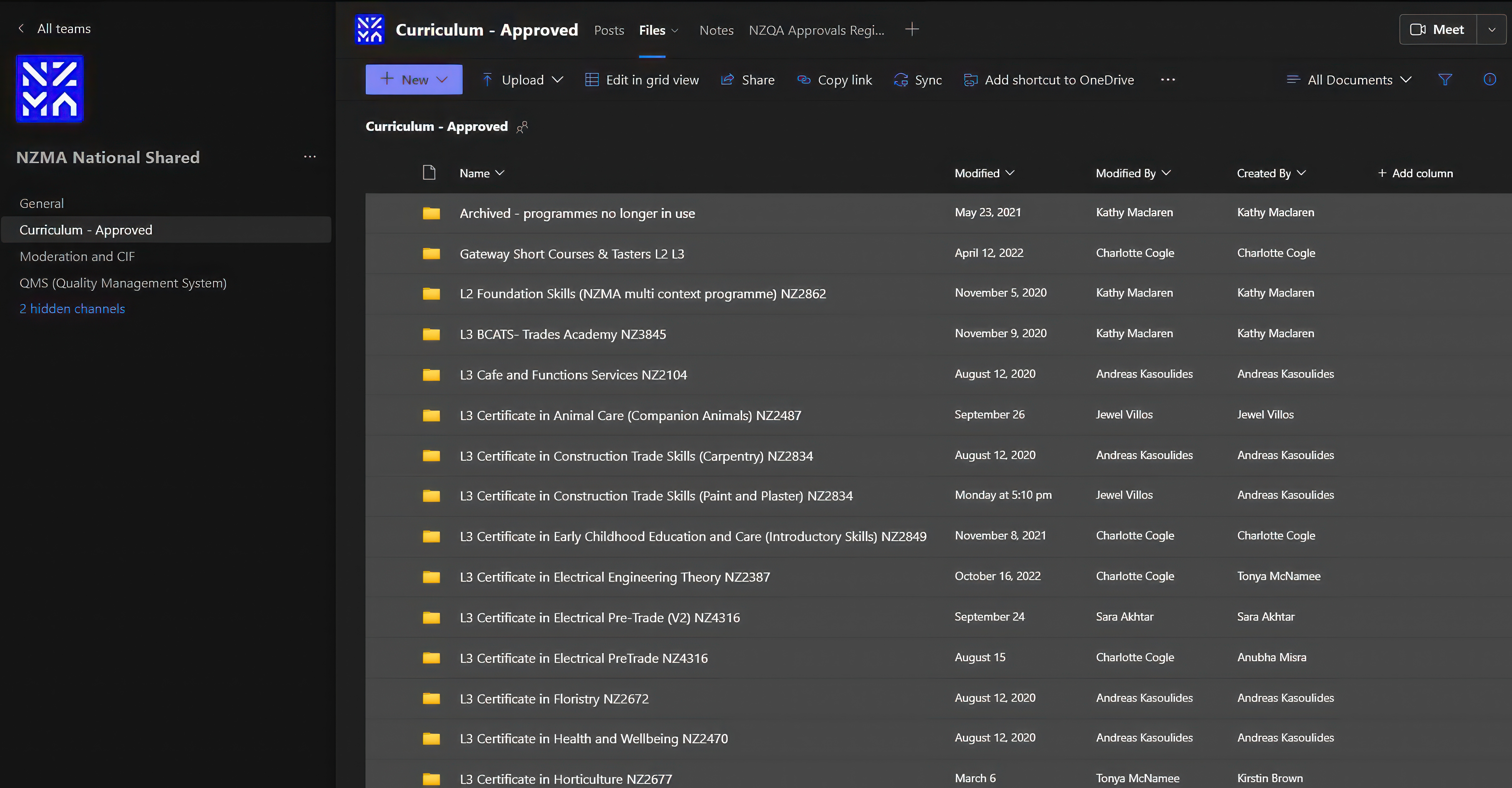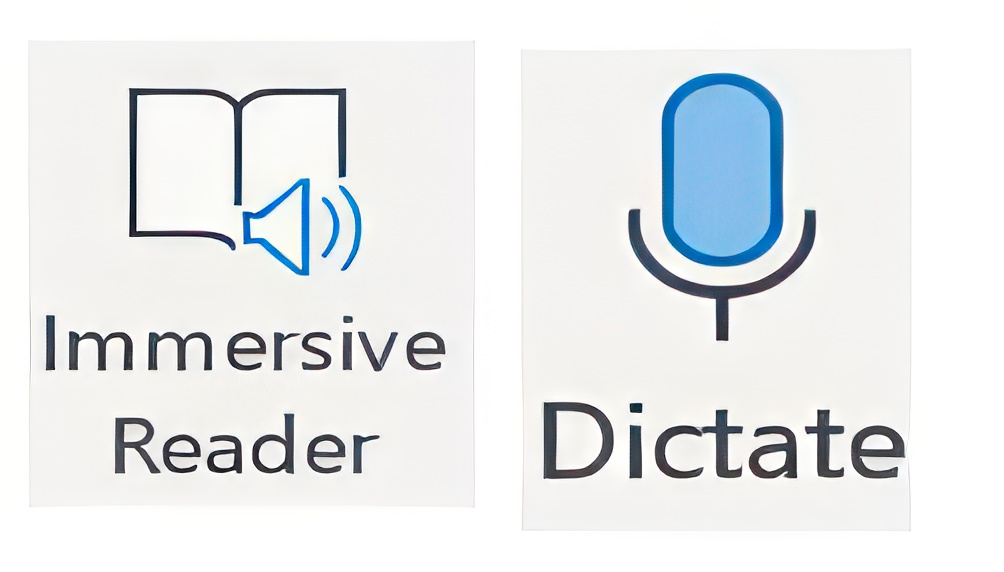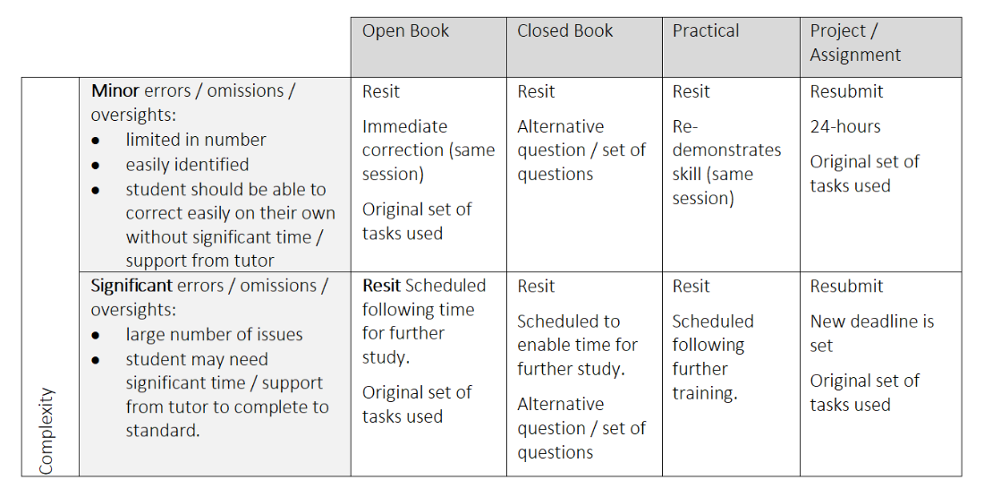This section covers some of the more common assessment processes. For more detailed guidance on types and methods of assessments please refer to the Assessing Process Toolkit in QMS which is designed to support good assessor practice and assist NZMA assessors in planning, preparing, conducting, and recording student assessment.
Assessment practice must always reflect the information, regulations and conditions in the approved assessment distributed to students. The tutor is responsible to ensure that the assessment guidelines are followed, so that all students get a fair opportunity to do as well as they can.
All course content and assessments have already been designed and approved for you to use in your facilitation.
You can access all course content by selecting NZMA National Shared/Curriculum – Approved/files or by following the below link:

It is mandatory to use the current assessment edition. To ensure you are using the current document, do not save files to your device. Check for any supplementary documents to be included with assessments prior to distribution to students.
Printed Assessment
- Always print directly from ‘Curriculum Approved’ and only print the number you require.
- Purchased assessment materials are ordered by a designated staff member on a regular cycle and are delivered as original prints to each campus - these must not be photocopied.
- Only order the number required, do not stockpile.
Digital Assessment
- Use the template from ‘Curriculum Approved’.

Assessment Conditions & Methods
Individual work must be completed individually in the student’s own words or referenced accordingly by sourcing the required information to complete the evidence requirements. Where indicated, students may discuss work with their peers.
Open book Assessment: Knowledge-based task question-and-answer style assessment that is supervised and timed whether in class or online. Students may use the materials listed on the assessment - this may be course material, hand- outs, notes, internet, standard industry text, calculators, English/bi-lingual dictionaries, etc.
Students will use the permitted materials to locate and apply information relevant to the assessment tasks.
Assignment - Project: Often involves the student applying knowledge and skills, problem solving creative approach to a specific task / scenario / objective. The student may work on this in their own time / offsite.
Students must be provided with a deadline for submission of their completed assignment.
Closed Book, Tests & Examination Assessments: This style of assessment is always supervised by a tutor, assessor, or invigilator to ensure the conduct and integrity of assessment, whether in class or online. Once the result is confirmed students may have supervised access to their original marked answers to review feedback. They may not remove this from the classroom or have a copy of assessment questions.
Practical Assessment - observation of skills: This may include demonstration, product, role play, presentation, naturally occurring evidence in a simulated setting, etc. Pay particular attention to the specific setting and equipment set out in the assessment conditions to ensure you set up the required assessment environment.
Group work refers to activities where students work together on a task. It can be challenging to manage depending on the group dynamic and participation of all group members. The tasks should still be achievable as no piece of evidence should rely on one individual doing it.
Where individual contribution is not clearly identified you can use verbal questioning of individual students in relation to the evidence produced and their contribution Some students may find it difficult to participate in a group for a variety of reasons. Where Teamwork is not part of the learning outcome, you might decide to assign the task as an individual one.
The penalties for late assessment after the submission deadline and non-submission of assessments are as follows:
- Competency based assessment – late/non- submission is recorded as a submission attempt ‘N’
- Graded assessment – late submission achieving the minimum mark or more will receive the minimum pass mark only
Where there is a legitimate need, you might grant an extension with a minimum period of one week under the following conditions:
- Prior to scheduled assessment date - an extension is applied for in writing at least two days before the due date.
- After scheduled assessment date – an absence approval form has been approved by campus management for the due date.
See Assessing Process Toolkit in QMS for full details on how to conduct different types of assessments.
Ensuring Students are Ready for Assessment
To ensure students are ready for assessment, they must complete adequate training with you prior to the date of assessment. Check they have done the requirement learning through conversation and formative class activities.
If a student has missed multiple days of class, ask yourself, will they have the knowledge/skills to be ready to be assessed with the rest of the class?
Students undertaking assessment must be informed of any conditions of assessment (including deadlines) and the criteria required for successful achievement.
For all assessment activities, you must inform your students of the conditions of the assessment and monitor that these are followed to ensure fairness and validity.
If you are unfamiliar with the assessment or the conditions, seek advice from the LSL regarding timing and any other points to note.
You may have students requiring specific assessment conditions due to an impairment or learning need. This could include: reader assistance, computer use or writer assistance, separate space to be assessed, rest breaks, extra time, braille translations, etc.
Access to NZMA programmes would be denied only in cases where it is not logistically possible or where the criteria for achievement could not be met.
Where there are costs associated with providing specific support, this would need to be authorised by Campus Management as part of enrolment conditions, you will be advised of agreed conditions and support required. Sometimes the student may not disclose they have specific needs till after they have started, if this happens to you, discuss it with your CM to check what options are available to the student.

There are a number of MS365 learning tools available to assist reading (immersive reader) and writing (dictate). Note these cannot be used if reading and or writing is a specific requirement of the learning outcome’s evidence criteria. If in doubt check with your LSL or FAL.
Where you think it is appropriate and/or necessary; individual students may provide verbal responses to specific assessment questions. You could ask students to use the dictate function or write the candidates response verbatim in the assessment.
If you write down the verbal responses given by the student, they need to confirm it is what they said. If you rephrase a question, you must write this on the page before the written response.
Note again these cannot be used where reading and or writing is a requirement of the evidence criteria.
MS Teams: For a worksheet that includes the verbal attestation signed by the student go to NZMA National Shared> General> Files> Course Administration> Assessment & Moderation Forms
Hospitality Programmes - alcoholic beverages: Students who are underage, without an Under 18 form Alcohol Guardian Consent form on file in SELMA (see Start of Course Checklist) and or any student who does not wish to participate in alcohol sampling for personal reasons may be assessed on theoretical evidence of alcohol characteristics only as commonly recognised within the hospitality industry.

Student evidence must be assessed against all specified criteria to meet learning outcomes.
- Ensure it is the students own work (authentic).
- Ensure your assessment decisions are consistent with the evidence and the assessment schedule and/or marking guide.
- You need to document and attach any adaption in assessment methods to the assessment (e.g., in relation to student’s specified needs).
Work submitted by students should be marked and returned within 7 working days. Short question & answer tasks should be returned the day following the assessment. Inform your students and CM if it is likely to take longer to complete marking. Marking timeframes can be extended where tasks are complex, or the marking is being peer verified.
Recording Results
A= achieved N= not yet achieved
Every assessment result needs to be discussed with the student.
Assessment opportunities must be indicated accurately. Submission dates up to 3 (this includes the original submission - refer to section on further assessment opportunities for details).
Most NZMA designed assessments include a tutor mark sheet/assessment schedule providing a section to identify submission date and whether criteria are achieved. Online assessments track the dates submitted via MS Teams Assignment or our LMS system.
Acknowledging results
- Printed - Assessment pack cover should be dated and signed by assessor when the student has received the final result (the date entered in SELMA must match this final result date). The student must sign the post-assessment agreement after receiving final result where this is included on the cover sheet.
- Digital / Online - The result must be electronically returned to the student to review feedback and result.
It is the assessor’s responsibility to ensure all relevant documentation is included in the assessment/ uploaded to assessment file prior to reporting and filing.
See the Assessing Process Toolkit in QMS for tips on marking printed / written assessments.
Resubmission sheets are available on this link.
Students are permitted up to three opportunities to meet the minimum requirements for any given assessment. The total number of opportunities includes the initial (first) submitted assessment and any subsequent attempts to meet requirements.
If a student misses the deadline or does not attend a scheduled assessment this counts as an assessment opportunity, they will only have two further opportunities to meet requirements.
All assessment attempts (opportunities) must be documented, dated and filed with the student’s assessment evidence.
- For handwritten work students must not cross out previous attempts (no use of twink/whiteout).
- It should be easy to identify further attempts. The student can use a different coloured pen or font for corrections to original evidence/or number their resubmission.


To support academic integrity, students must be regularly reminded of requirements for authenticity of student evidence.
- Ensuring that all your students are aware of and comply with the assessment conditions
- Ensuring your students complete authenticity declaration to confirm they have understood the assessment requirements and conditions for submitting authentic evidence.
As an assessing tutor you must ensure your assessment decisions are consistent with submitted evidence, marking guides and assessment standards. When in doubt, discuss this with your LSL.
See Maintaining Academic Integrity for information on assessment misconduct.
Printed Assessments
Any submitted work must have the authenticity declaration completed and signed.
Digital / Online Assessments
Submitted using the Microsoft Teams assignments tab or the NZMA LMS.
Any submitted work must have the authenticity declaration attached and completed.
Higher level programmes at NZMA use a plagiarism detection software tool for other forms of written assessment. The software will scan assessments and assess levels of similarity and plagiarism. Each Level 5+ tutor should have their own their own Turnitin account. Tutors setting up a class in Turnitin must include quality@nzma.ac.nz as an instructor as part of moderation requirements.
MS Teams: Class Teams Assignments and Turnitin guides are located in NZMA National Shared> General> How to Guides

The NZMA Moderation policy and process ensures NZMA has capability and capacity to ensure assessment materials and assessor decisions support fair, reliable, valid, consistent, authentic, and sufficient assessment.
The goal of moderation is to ensure:
- Assessment materials allow learners the opportunity to achieve the learning outcome(s)
- Assessors are making accurate and consistent judgements about learner performance.
- Assessors are provided valid constructive feedback, and support for continuous improvement of professional practice.
Moderation is divided into different categories:
Pre-moderation is the quality management process used to ensure assessments meet the national standard. This provides a confirmation of whether the assessment is fit for purpose and provides recommendations for improvement.
The purpose of pre-moderation is to provide assurance that the materials used for assessment address all requirements of the standard/module/course and that adequate marking guidance is provided.
Internal moderation in-campus and inter-campus takes place regularly according to what is outlined in the moderation schedule.
External moderation occurs within each programme and is managed by the Quality Manager.
The Campus Moderation Coordinator (CMC) is responsible for managing post moderation on campus and the inter-campus moderation process. The CMC will advise you when your assessments have been moderated and your Learning and Development Lead will review any developmental areas with you.
Moderation can either be completed by a qualified LM or in a group moderation (whichever works best and has value at its centre). A mix is recommended for all campuses. The benefits of group moderation are that there is better discussion, better transparency and gives those new to moderation an opportunity to grow their moderation skills.
For moderation purposes assessment decisions and assignment design, assessments must be moderated with the correct version of the unit standard or appropriate learning outcomes (LO’s) and related (GPO’s) according to the programme document.
The lead moderator must hold US4098, US11551 or equivalent credential.
All staff will take part in moderation group sessions as part of on-going commitment to development and learning.
Separate to the CMS, additional moderation may be scheduled for new tutors as part of their PDP.
It is necessary in the first few months of a new tutor starting that the LDL continues to review the tutor’s marking ability and for the first 3 assessments, to mark a class with them (look at the “tricky ones” together, buddy them with an experienced and qualified assessor or get them to assist with some marking to better assess their abilities). The LDL should look for opportunities and ensure there is a level of confidence achieved for both parties that the marking is meeting the standard required.
All additional moderation records and moderated samples are to be saved online as part of the reporting process.
A complete guide to this process is available below:
AM02_GUIDE_Moderation Process Toolkit.docx
Tutors without 4098 (assessment unit standard)
Prior to student receiving assessment results, for the first 5 weeks of assessing, samples for each different assessment the new tutor assesses, will need to be moderated and recorded in the online moderation form.
From week 6, the LSL will review the new tutor’s assessing confidence and capability in assessment for the last 3 assessments. If they still need support, moderation will continue for each different assessment until the LSL has confidence in the tutor’s assessment decisions and / or 4098 or equivalent is gained. From then on, their assessing will be moderated according to the Campus Moderation Schedule.
All additional moderation records and moderated samples are to be saved online as part of the reporting process.
